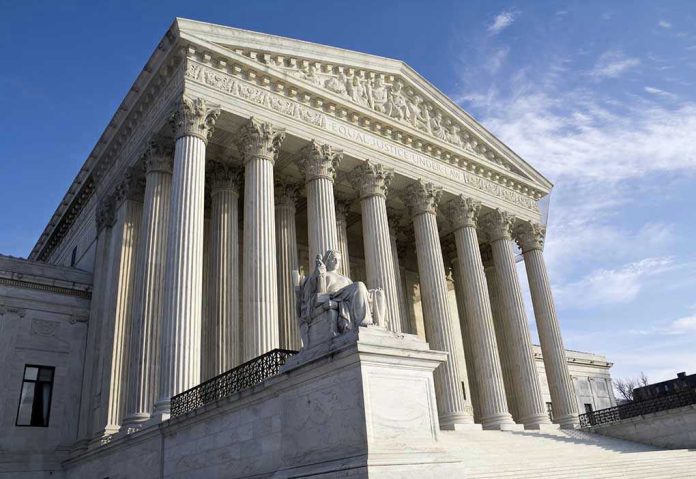
The Supreme Court’s decision on mail-in ballot deadlines could redefine election fairness and voter access across the United States.
Story Snapshot
- Supreme Court to decide on the legality of counting mail-in ballots received after Election Day.
- The case could impact election laws in 16 states and Washington, D.C.
- Decision may affect military, disabled, and absentee voters nationwide.
- Potential shift in the balance between state election flexibility and federal law.
Supreme Court’s Role in Election Law
The U.S. Supreme Court has agreed to hear *Watson v. RNC*, a pivotal case concerning the mail-in ballot deadlines in Mississippi. The case challenges the state’s law allowing ballots postmarked by Election Day to be counted if received within five business days. This decision will not only affect Mississippi but also 16 other states and Washington, D.C., which have similar laws. The implications could potentially influence millions of voters across the nation, especially those who rely heavily on mail-in voting.
The Republican National Committee (RNC) argues that Mississippi’s grace period law conflicts with federal statutes that dictate a single Election Day. Mississippi’s law, passed in 2020, sought to accommodate postal delays and prevent disenfranchisement. The Supreme Court’s decision to take on this case is a significant step that could reshape how elections are conducted in the United States, highlighting the tension between state flexibility and federal uniformity in election laws.
Historical Context and State Flexibility
Mail-in voting has been a longstanding element of U.S. elections, particularly benefiting military and overseas voters. The COVID-19 pandemic in 2020 spurred an expansion in mail-in voting, with several states adopting grace periods to account for postal delays. Mississippi’s Republican-controlled legislature passed its grace period law during this time, aiming to ensure votes were not lost due to mail service disruptions.
The RNC and like-minded groups have challenged such laws, citing a need for adherence to federal election day standards. The outcome of this Supreme Court case could either affirm or challenge states’ rights to implement flexible voting measures, influencing ongoing debates over election integrity and voter access.
Potential Impacts on Voter Access
The decision will directly affect military, disabled, and absentee voters who depend on mail-in ballots. These groups could face significant challenges if the grace periods are eliminated, potentially disenfranchising voters who act in good faith but encounter postal delays. The case underscores broader concerns about election fairness, particularly in close or contested elections where mail-in ballots can be decisive.
Election officials may also confront increased administrative burdens if required to adjust to stricter deadlines. States with existing grace periods might need to overhaul their election procedures, a change that could strain resources and reduce voter turnout among those reliant on mail-in voting.
Broader Political and Social Ramifications
The Supreme Court’s ruling could have sweeping political and social repercussions. A decision against grace periods might reduce mail-in voting participation, affecting election outcomes in states where mail-in voting is prevalent. This change could further polarize partisan debates over election security and accessibility, particularly if the ruling is perceived as disenfranchising certain voter groups.
Furthermore, the postal service may face increased scrutiny concerning delivery times, while election technology providers may need to adapt systems to accommodate new deadlines. The decision will likely set a precedent for federal versus state control over election procedures, influencing how future election laws are crafted and implemented.







